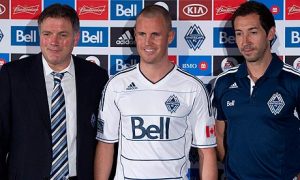The Problem with Designated Players
When it comes to paying players, bigger does not guarantee better.
James Keep
March 1st 2013

It all started six years ago when, in January 2007, David Beckham announced he would be joining the LA Galaxy.
The signing of Beckham was seen as a coup for the MLS side and was designed, in part, to bring global attention not only to the team but the league as a whole. The only question was how a star like Beckham, who would command a rather large salary, fit into a system which had a strict salary cap of $2.1m.
This led to the introduction of the “Designated Player rule”, often referred to as the “Beckham rule”, which allowed each club to have up to two players who’s wages could be partially funded outside the salary cap by the clubs owners ($400,000 still counting against the cap).
Since then there has been a deluge of stars entering the league with big names such as Thierry Henry, Tim Cahill, Marco Di Vaio, Robbie Keane and Alessandro Nesta to name but a few, and while David Beckham may since have returned to Europe the wave of big names linked with the league shows no sign of drying up. Frank Lampard, Kaka, Ronaldinho and Javier Saviola just some of the rumours that refuse to go away.
However, here in lies the problem. For every big name linked to MLS there’s two or three that could, quite rightly, leave people scratching their heads. Players who seem to have hit a dead end in their careers, have maybe fallen off the tracks or have just simply gotten old and see MLS as an easy payday. One last big wage before they sail off into sunset. The football equivalent of the best exotic Marigold hotel. One last stop before the inevitable turn into coaching or punditry.
For me, the most important question is how many of these designated players actually do any good? What do they actually bring to the league?
With Beckham it was undoubtedly all about the brand, plus however many assists he got the Galaxy when he was actually playing. With Henry, it was his experience, leadership, star quality and undoubted flare (his goal direct from a corner against the Columbus Crew will be long remembered). Robbie Keane’s 16 goals last term helped Galaxy win their 4th MLS cup and the man who was once mistaken for a fan in a team picture became, arguably, the team’s most valuable player after returning from a poor showing at Euro 2012. De Vaio and Nesta bring ridiculous amounts of experience but also help convince other compatriots and young players to join them. What about the rest?
I can’t help but looking at the example of three players who arrived in the league last season. First up we have the example of the Vancouver Whitecaps who signed not one but two Scottish players who were most recently plying their trade in the second tier of English football. Barry Robson was the first to arrive, joining from Middlesbrough FC where he had scored 6 goals and managed 4 assists during the 11-12 season. Kenny Miller followed shortly after, leaving Cardiff City where he had scored 11 goals in 50 appearances. What business either of these two had being designated players is beyond me, as indeed it eventually was on the Whitecaps fans, but I’m sure it had nothing to do with Caps manager Martin Rennie also being Scottish.

Midfielder Robson was signed to a deal worth $596,000 per year and scored 3 goals in 18 game but managed only 2 assists while Miller scored 2 paltry goals in 14 games with 1 assist on a contract worth $1.24m a year. Unsurprisingly, the Whitecaps, who had won 7, lost 4, drawn 5 and were sitting comfortably 3rd in the Western conference, went on a dismal run, winning 4, losing 9 and drawing 5 of their remaining games, scrapped into the playoffs and were eliminated at the first hurdle by eventual winners LA. Robson has since departed, by “mutual consent”, claiming family reasons and an inability to settle, but Miller, somewhat obviously, is in no hurry to part with his lucrative deal.
The other glaring example is that of the Portland Timbers and Kris Boyd, yet another Scottish player. In 2011, Portland’s first season in MLS, they finished 12th with 42 points and 40 goals. Not a bad first season but their main problem had been that they conceded 48 along the way. Instead of dealing with that problem, head coach John Spencer (also Scottish) chose to bring in Kris Boyd, a player who was without a club, to add some spice to the attack. It didn’t work. In 26 appearances Kris managed 7 goals and 1 assist while the Timbers slumped to an 17th place finish, scoring only 34 goals and conceding 56. John Spencer received the chop half way through the year and during the offseason, new manager Caleb Porter made it clear Boyd would not be a part of his plans. Leaving Kris’ greatest impact on Portland a rather unusual voiceover job for a mattress company.
I have no problem with players coming to the MLS, many may well contribute something to their side but most do not merit designated player spots. If they just want to play football, fine, give them a trial, if they impress you, cool, find them an international roster spot, have they done anything to really deserve a DP slot? Probably not. Too many of them arrive in this league on big pay-checks, earning far more than the rest of their teammates, without any real pedigree to back up such a move.
Back to Portland and they have just announced the signing of Mikael Silvestre, a centre back who spent nine years at Manchester United and won five Premier league titles and one Champions League in 361 appearances. He also spent time at Arsenal and Inter Milan but was another player without a club after being released by Werder Bremen last summer. While it’s good to see Portland at least trying to address their defensive frailty here , at 35 you’ve got to believe Silvestre has been signed more as a stop gap and for the experience he can impart upon the younger players at the Timbers. In fairness to Silvestre, he’s done it the right way, spending time on trial with both Seattle and Portland and obviously impressed Porter and owner Merritt Paulson enough to warrant the move.
Vancouver on the other hand have seemingly not learnt their lesson, having just signed Nigel Reo-Coker, another player who was without a club following an unsuccessful 3 month stint with English second tier side Ipswich. The year before that he was playing for Bolton Wanderer, scoring 3 goals in 43 appearances yet providing 0 assists. You could maybe argue that Reo-Coker has more of an impact defensively but since Bolton were relegated that year I would suggest otherwise. Reo-Coker has absolutely no resume to back up such a move and has something of a reputation as a disruptive force in dressing rooms. Whether this signing will work out any better for the Whitecaps though, only time will tell.
As we go into the 2013 MLS season each team can now have up to 3 designated Players with only $350,000 of their wages counting against the salary cap (that is the extremely watered down version) and each slot can be used for a number of different things. Many are still used to attract players who will improve not only the quality of football but also the marketability of the club. A signing who can help raise awareness of that team on a bigger stage, someone who can be thrown up on a billboard next to leading stars from NFL, NBA or MLB. Sometimes they can be used to help retain one of your best players as was the case with Freddy Montero who, after scoring 22 goals and 17 assist in his first 2 years, was rewarded with just such a deal. Landon Donovan, who is eventually returning to LA, has been a DP since before the rule was introduced but it only became official in 2010.
A great number of these slots are used for such players, sure, but many don’t tick any of those boxes. With the growing number of young players from MLS teams being snapped up by European clubs are there other players already in the league who deserve such contracts to try and keep them? Chris Wondolowski, who last season tied the record for most goals scored in a single season , has an army of San Jose fans calling for such a deal through fear they might lose him but, simply put, most teams in MLS can’t compete with the huge budgets in Europe, nor should they try to. The sale of these players helps to fund other things such as, ironically, paying players more. Dwayne De Rosario, one of the league’s longest serving players and greatest ambassadors, earned more than $500,000 last season but is not a designated player, the excess in his wages being covered completely by allocation money from trades and other deals.
Still, while they can’t necessarily hold onto them, I for one would like to see teams reward more of the young players on the teams with better contracts, perhaps spreading the wages around more evenly, rather than wasting them on marquee players from abroad who perhaps offer very little. If they will insist on bringing in these players though they need to vet them more carefully. Especially if they’re Scottish.

